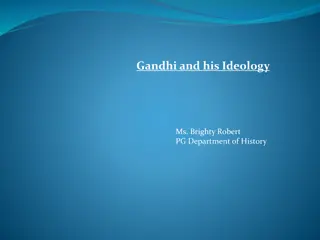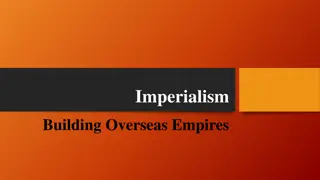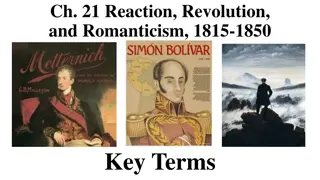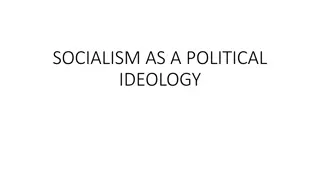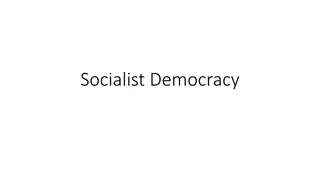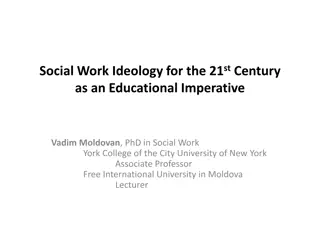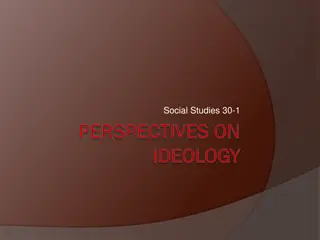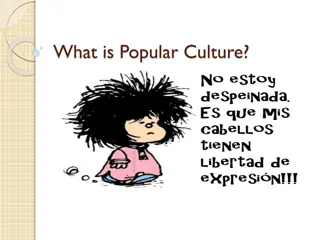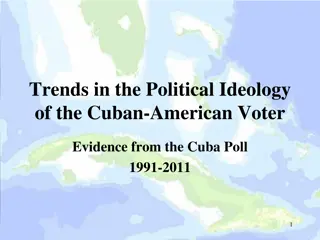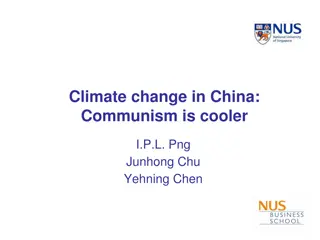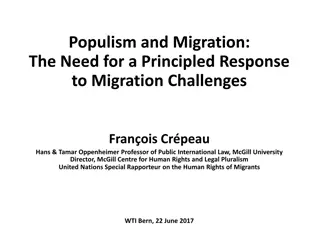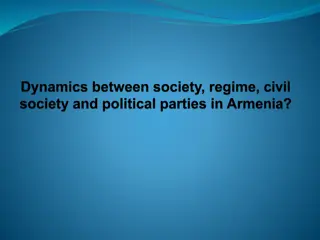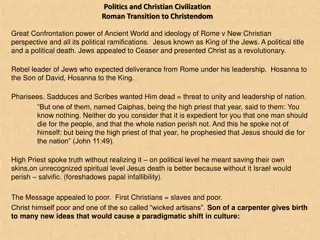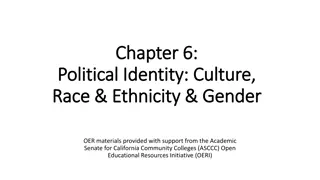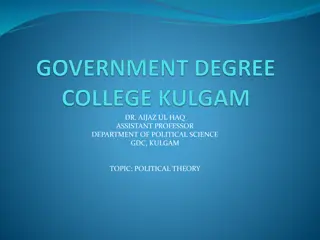Mahatma Gandhi and His Ideology in Indian History
Mahatma Gandhi, a pivotal figure in India's freedom struggle, advocated for non-violence, truth, and self-realization. He reshaped the Indian National Congress and empowered the masses to fight against injustice through civil disobedience. Gandhi's ideologies of swadeshi, local democracy, and truste
0 views • 28 slides
Understanding Religious Conflict: Definition and Types Explored
Religious conflict is a complex and recurring concept throughout history. Scholars have defined it as disagreements between religious groups. This conflict arises from contentious issues touching on ideology, morality, power, and identity, influenced by various socio-political, economic, and cultura
1 views • 13 slides
European Imperialism in the Late 19th Century
European nations in the late 1800s pursued imperialism to expand their empires for economic, political, and social reasons. Motives included economic interests, political and military ambitions, and the ideology of Social Darwinism. The Industrial Revolution fueled the need for resources and markets
1 views • 14 slides
Interdisciplinary Approach in Political Science and Its Relation with History
The need for an interdisciplinary approach in political science emerged in the 20th century to study political issues from various social science perspectives. This approach emphasizes the interrelation between political science and other disciplines like history. History provides the foundation for
0 views • 23 slides
Understanding Class Struggle in Animal Farm through Marxist Ideology
Animal Farm, written by George Orwell, explores the concept of class struggle through the lens of Marxist ideology. The novel depicts the conflict between the bourgeoisie, represented by characters like Mr. Jones, and the proletariat, symbolized by the other animals on the farm. Through the story of
0 views • 12 slides
Institutionalism and Methodological Issues in Political Science
Institutionalism is a foundational concept in political science, emphasizing the study of governing institutions and their role in shaping political behavior. It explores inductive and deductive approaches to research, highlighting the significance of empirical evidence and theoretical assumptions.
0 views • 19 slides
Understanding Gramsci's Political Theory and its Relevance Today
Gramsci's political theory, focusing on concepts such as hegemony, historical bloc, and the role of intellectuals, offers valuable insights into contemporary political challenges. Explored through the lenses of Prof. Ken Spours and Stuart Hall's analytical tradition, this analysis sheds light on Con
0 views • 13 slides
Understanding Liberalism: Key Ideas and Historical Context
Liberalism, a prominent political ideology, emerged in the 19th century and is closely linked to capitalism. It stands against absolutism and feudal privileges, advocating for individualism, freedom, reason, equality, toleration, consent, and constitutionalism. The evolution of liberalism emphasized
1 views • 18 slides
Key Terms in Ch. 21: Reaction, Revolution, and Romanticism, 1815-1850
The key terms discussed in Chapter 21 include principle of legitimacy, balance of power, ideology, conservatism, principle of intervention, ultraroyalists, ministerial responsibility, and liberalism. These terms highlight important political philosophies and concepts during the post-Napoleonic era a
0 views • 17 slides
Understanding Socialism: A Comprehensive Overview
Socialism is a political and economic ideology that advocates for collective or state ownership of production, distribution, and exchange. It emerged in the early 19th century as a response to industrial capitalism, aiming for a more egalitarian society that prioritizes collective well-being. Social
0 views • 9 slides
Evolution of Citizenship in Liberal Democracy
Citizenship within liberal democracy entails equal rights, duties, liberties, and constraints for individuals within a political community. The entrenchment of civil and political rights has shaped the struggle for membership and participation in political communities. Civil rights, essential for in
1 views • 11 slides
Understanding Socialist Democracy: A Political Ideology Explained
Socialist democracy is a political idea that combines elements of democracy and socialism, rejecting capitalism and authoritarian socialism. Proponents advocate for democratic decision-making and public ownership of the means of production. They believe in economic equality, government regulation of
2 views • 13 slides
Understanding Political Theory through a Contextual Approach
Exploring G.H. Sabine's perspective on political theory through a contextual approach, emphasizing the importance of historical context and societal influences. Sabine argues that while political theory evolves with its contemporary politics, it should be analyzed within its specific time and social
0 views • 9 slides
Social Work Ideology for the 21st Century: Educational Imperative
Social work education must adapt to current global challenges by reexamining ethical principles in light of perpetual warfare, fake news, and economic globalization. This paper discusses the relevance of social values in a changing world and proposes pedagogies for promoting a modern social work ide
0 views • 14 slides
Understanding Ideology and Society: Perspectives and Beliefs
Explore the significance of ideology in shaping societal perspectives, beliefs, and values. Understand the impact of ideologies on laws, societal structures, and individual behavior. Delve into concepts such as liberalism, individualism, and collectivism to gain insights into human societies through
4 views • 26 slides
Understanding Critical Theory in International Relations: A Deep Dive
Critical theory in IR since the mid-1980s challenges traditional views by emphasizing culture, ideology, and societal structures over objective truths. This approach questions the relationship between theory and practice, highlighting issues of inequality beyond just class, including race, ethnicity
0 views • 9 slides
Understanding Popular Culture and Ideology
Popular culture encompasses the lived practices and artistic products of society, contrasting with high culture. Various definitions highlight its appeal to a wide audience and its distinction from high culture. The relationship between popular culture and ideology is explored through practices that
0 views • 15 slides
Understanding Political Beliefs and Behaviors: A Comprehensive Overview
Explore the formation, evolution, and transmission of political beliefs, as well as the impact of differing beliefs and behaviors on the political process. Delve into platform issues, political affiliations, and their influences to gain a deeper understanding of the political landscape.
1 views • 53 slides
Understanding Nationalism in Political Science
Nationalism, a complex concept, defines the nation as the fundamental unit of political rule. It encompasses a mix of objective and subjective factors, including cultural, ethnic, and political traits. The definition of a nation is subjective, based on how its members perceive themselves as a distin
0 views • 27 slides
Analysis of Ideology in Thomas Pynchon's "The Crying of Lot 49
This analysis delves into the story and ideology in Thomas Pynchon's novel "The Crying of Lot 49". The plot follows Oedipa Maas as she investigates the mystery of Tristero, a secret postal service. Set in California during the 1960s, the novel reflects the societal context of America during the Cold
0 views • 15 slides
Challenges and Opportunities in EU-China Strategic Partnership
The EU-China strategic partnership faces challenges concerning ideology, human rights, and political systems, while also presenting opportunities for cooperation based on mutual interests. The EU aims to engage China politically, support its transition towards an open society, and integrate it into
0 views • 9 slides
Changing Trends in Cuban-American Voter Ideology
Explore the evolving political ideology of Cuban-American voters from 1991 to 2011 through data on migration, residency, naturalization, and political exceptionalism. Uncover how these trends have influenced Miami's Latino demographics and the Cuban perspective on US/Cuba relations.
0 views • 24 slides
Understanding Political Science: A Comprehensive Overview
The study of political science delves into various aspects, from the pursuit of the good society to the exercise of power and the allocation of resources. It encompasses specialized fields such as American politics, international relations, comparative politics, public policy, and political philosop
0 views • 5 slides
Evaluating the Impact of Communism on Climate Change in China
This study analyzes the effects of political ideology on climate change in China, specifically focusing on the difference in extreme temperatures from 1954 to 2010. Results show a significant decrease in extreme temperatures in earlier years followed by an increase from 2000 onwards, particularly du
0 views • 73 slides
The Rise of Communism in Russia: Key Figures and Events
Russia's transition to communism was marked by social and political upheaval, with figures like Karl Marx, Lenin, Trotsky, and Stalin playing pivotal roles. The Russian Revolution, civil war, and the rise of the Soviet Union reflected a shift towards communist ideology, leading to significant change
0 views • 37 slides
Political Development Theory and Practice: An Overview
Political development refers to the evolution of institutions forming the political power system of a society. Initially popular in the 60s-70s to describe political change, it later fell out of favor for being Euro-centric but has since regained significance. The concept encompasses aspects like po
0 views • 13 slides
Political Party Funding Act 2018 Overview
The Political Party Funding Act of 2018 in South Africa aims to enhance multi-party democracy by regulating the funding and donations to political parties. It establishes the Multi-Party Democracy Fund funded by private sources, alongside the existing Represented Political Party Fund. The Act prohib
0 views • 17 slides
Understanding Political Party Funding Act of 2018
The Political Party Funding Act of 2018 regulates the funding of political parties in South Africa, ensuring equitable and proportional funding for parties participating in national and provincial legislatures. The Act defines various terms such as donations, foreign persons, and political parties,
0 views • 42 slides
Addressing Populism and Migration Challenges: A Principled Approach
Populism, defined as a political ideology emphasizing the interests of the common people over established institutions, plays a significant role in shaping responses to migration. Economic inequality, cultural cleavages, and social deprivation contribute to the rise of populist sentiments, leading t
0 views • 15 slides
Main Actors Society and Regime Characteristics Analysis
Analysis reveals a society characterized by passivity, apathy, and patron-client relationships, with emigration as a major form of social protest. The regime exhibits consolidating authoritarianism, convergence of business and political elites, and systemic corruption. Oligarchic dominance, small an
0 views • 6 slides
Evolution of Political Ideas and Influences on American Founding
In the history of politics, major ideas like laws of nature, unalienable rights, divine right of kings, social contract theory, and rights of resistance have influenced the American founding. Various traditions such as Judeo-Christian, English common law, Enlightenment, and republicanism played a si
0 views • 68 slides
Transition from Roman Politics to Christian Civilization: A Paradigmatic Shift
The transition from Roman politics to Christian civilization marked a significant confrontation between the powers of the ancient world and the ideology of Rome versus the new Christian perspective. This shift had profound political ramifications, with Jesus being known as the King of the Jews, spar
0 views • 7 slides
Explore the Fascinating World of Political Science
The Department of Political Science offers a range of courses, delving into topics such as political theory, international relations, and governance. Understand the distinction between politicians and political scientists, and explore branches of political science like public administration and huma
0 views • 16 slides
Understanding Political Identity: Culture, Race & Gender in Society
Explore the intricate aspects of political identity, culture, race, ethnicity, and gender in society. Discover how individuals shape their identities and the impact of political mobilization on society. Uncover the significance of political socialization and the role of societal institutions in shap
0 views • 20 slides
Evolution of Political Protests in Modern Russia: A Historical Overview
This article provides an in-depth analysis of the evolution of political protests in modern Russia from 1990 to present. It discusses the attitude of Russian journalists towards protests, basic concepts of political protest in modern political science, myths surrounding protests in Russia, and the f
0 views • 24 slides
Impact of Political Stability on Equity Trading Costs of Cross-Listed Firms
The research explores the relationship between political stability and equity trading costs of cross-listed firms, highlighting the impact of political institutions, liquidity, and investor protection. It delves into the importance of factors like quality of political institutions, transparency, and
0 views • 24 slides
Interdisciplinary Relationships in Political Science
Political science and history share a symbiotic relationship, with history providing the foundation for political analysis while political science influences historical events. The contribution of economics to political science is evident in how economic conditions shape political ideologies and pol
0 views • 12 slides
Understanding Political Theory: Definitions, Differences, and Significance
Political theory encompasses systematic explanations of political phenomena, distinct from political thought which involves ideas and opinions of philosophers. It constitutes both political science and philosophy, addressing both empirical and evaluative aspects. The significance lies in finding sol
0 views • 7 slides
Remedial Measures Implemented by Indian Political Party
Explore the impactful remedial measures taken by a prominent political party in India through a collage presentation. Delve into the functions of political parties, understanding partisanship, the necessity of political parties, and more. Gain insights into the significance and role of political par
0 views • 23 slides
Hu Yaobang: The Forgotten Hero of China’s Political Landscape
Explore the life and legacy of Hu Yaobang, a significant figure in Chinese history. From his early years as a youth leader to his controversial removal as CCP general secretary, Hu's contributions towards democracy, reconciliation efforts in Tibet, and challenging of Maoist ideology are highlighted.
0 views • 18 slides
